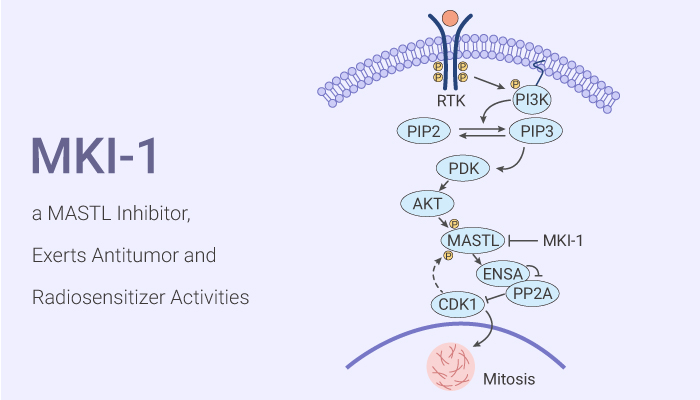Mitosis is an attractive target for selective anticancer treatment. Mitotic kinases, including CDKs, AURKs, and PLK1, associate with tumor progression and prognosis.
However, these agents are cytotoxicity to healthy cells. inhibitors against these mitotic kinases produce disappointing clinical results. As defects in mitotic checkpoints cause severe genomic instability and aneuploidy. This will selectively induce the mitotic catastrophe in cancer cells. Mitotic checkpoints act as targets for selective anticancer treatment.
MASTL is a mitotic kinase involved in mitotic progression, as known as Greatwall kinase.
MASTL regulates mitosis and meiosis via the inactivation of the protein phosphatase 2A complex. Additionally, MASTL L is overexpressed in several types of cancers, including breast, head and neck, thyroid, and colorectal cancers. Moreover, MASTL inhibition causes mitotic cell death in various cancer cells, with less damage to the normal cells.
Collectively, in cancer research, MASTL is an attractive target for a therapeutic combination with radiotherapy.
In this article, we will introduce an inhibitor of MASTL( IC50=9.9 μM), MKI-1.

MKI-1 is a potent inhibitor of MASTL. It exerts antitumor and radiosensitizer activities through PP2A activation in breast cancer.
Firstly, in vitro, MKI-1 inhibits the activity of MASTL in breast cancer cells, At 100 μM, MKI-1 inhibits various oncogenic properties of breast cancer cells but shows much weaker effects on the viability of normal breast cells. In MCF7 and T47D cells, MKI-1 clearly reduces both serine 62-phosphorylation of c-Myc and total c-Myc. It Inhibits the phosphorylation of ENSA and significantly inhibits the phosphorylation of ENSA in mitotic cells.
Nextly, Five-week-old female BALB/c nude mice. MKI-1 reduces tumor growth and enhances the radiosensitivity of the BT549 xenograft model in response to 6 Gy irradiation compared with the control group. Additionally, there exist no notable changes in body weight, suggesting the absence of gross toxicity in mice.
In conclusion, MKI-1 is a promising MASTL for cancer research.
Reference:
Ah-Young Kim, et al. Front Oncol. 2020 Sep 29;10:571601.